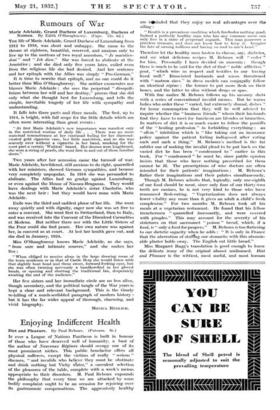Rumours of War
Marie Adelaide, Grand Duchess of Luxemburg, Duchess of Nassau. By Edith O'Shaughnessy. (Cape. 12e. 6d.) Trot life of Marie Adelaide, Grand Duchess of Luxemburg from 1912 to 1918, was short and unhappy. She came to the throne at eighteen, beautiful, reserved, and anxious only to live up to the mottoes of two royal ancestors, " Je maintien- drai" and " leh diem." She was forced to abdicate at the Armistice ; and she died only five years later, exiled even from the religious life she had desired. And her sentence and her epitaph with the Allies was simply Pro-German."
It is time to rewrite that epitaph, and no one could do it better than Miss O'Shaughnessy. She neither exonerates nor blames Marie Adelaide : she sees the perpetual " disequili- brium between her will and her destiny," proves that she did only what she thought best for Luxemburg, and tells the simple, inevitable tragedy of her life with sympathy and understanding.
It falls into three parts and three moods. The first, up to 1914, is bright, with full scope for the little details which are often more interesting than great events :
" At first Marie Adelaide's new importance was manifest only in the restricted routine of daily life . . . There was no more maternal remonstrance at her continual feeling for her diamond- crested gold cigarette case, hor little matchbox, and so she was scarcely over without a cigarette in her hand, smoking for the most part a certain 'Waldorf ' brand. Her dresses were lengthened, she wore a string of pearls, she went first in and out of those familiar doors."
Two years after her accession came the turmoil of war. Marie Adelaide, bewildered, still anxious to do right, quarrelled with her ministers, showed German sympathies, and became very completely unpopular. In 1918 she was persuaded to abdicate. The Allies had no grudge against Luxemburg, or even against the House of Nassau-Braganza. They would have dealings with Marie Adelaide's sister Charlotte, who was the next heir : but they would have none with Marie Adelaide.
Exile was the third and saddest phase of her life. She went away quietly and with dignity, eager now she was set free to enter a convent. She went first to Switzerland, then to Italy, and was received into the Convent of the Discalced Carmelites at Modena. But neither there nor with the Little Sisters of the Poor could she find peace. Her own nature was against her, in convent as at court. At last her health gave out, and she died in January, 1924.
Miss O'Shaughnessy knows Marie Adelaide, as she says, " from sure and intimate sources," and she makes her live :
"When obliged to receive alone in the large drawing room of the town residence or in that of Castle Berg she would listen with that slightly bent head and those sweet, forward-looking eyes, but she was often twisting nervously a handkerchief in her gloved hands, or opening and shutting the traditional fan, desperately awaiting the end of the audience."
Her five sisters and her immediate circle are no less alive, though secondary, and the political tangle of the War years is kept a clear and relevant background. This is the timely re-telling of a much-scribbled paragraph of modern history : but it has the far wider appeal of thorough, charming, and vivid biography.
MONICA REDLICH.




































 Previous page
Previous page